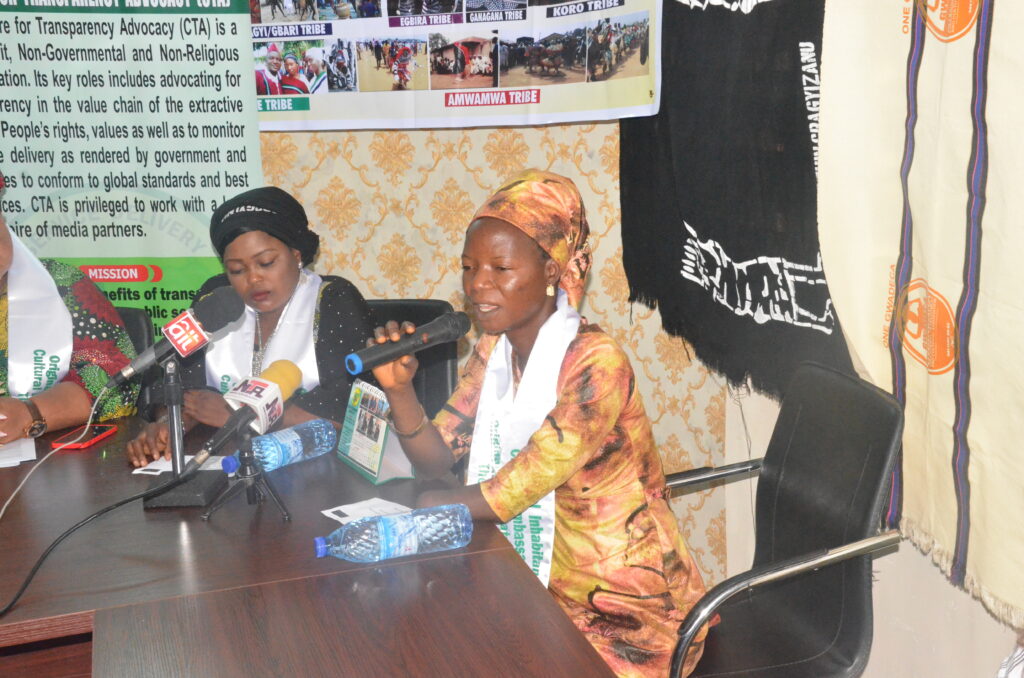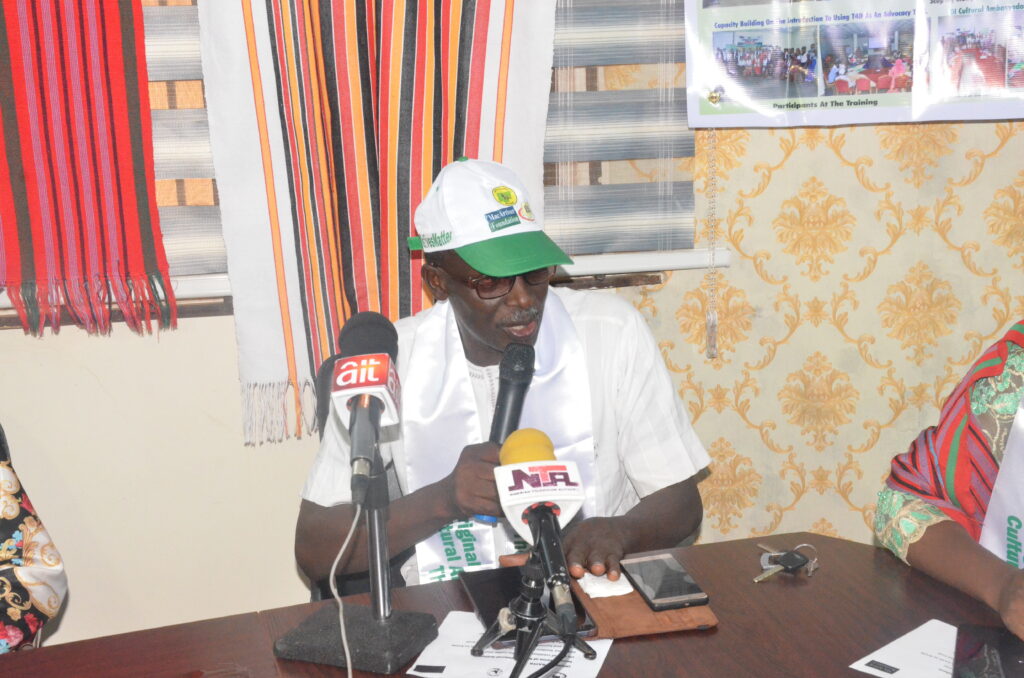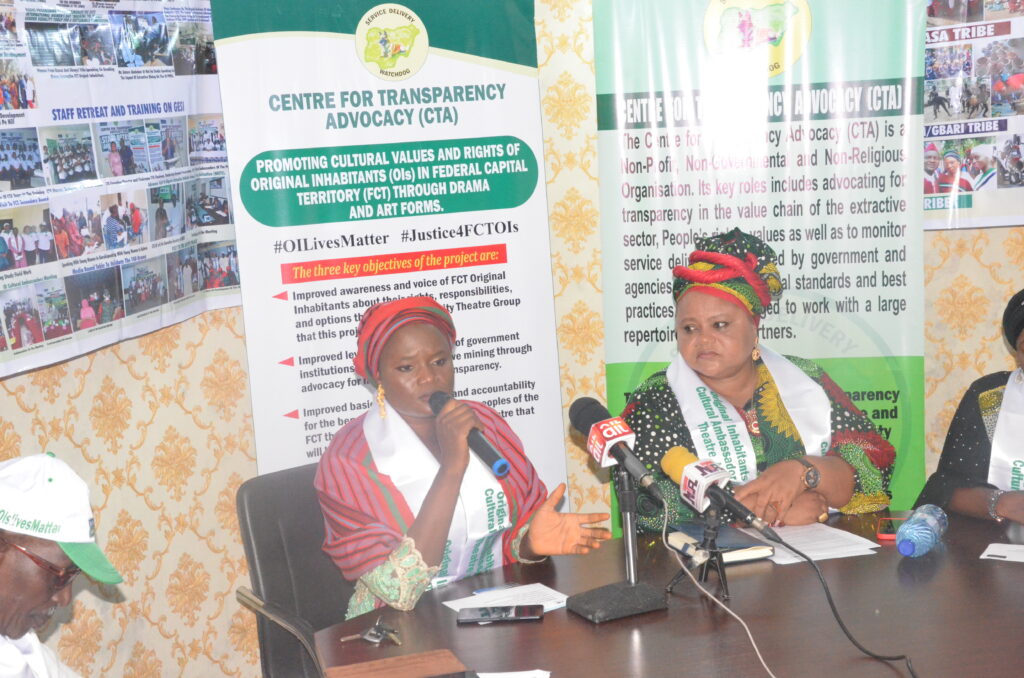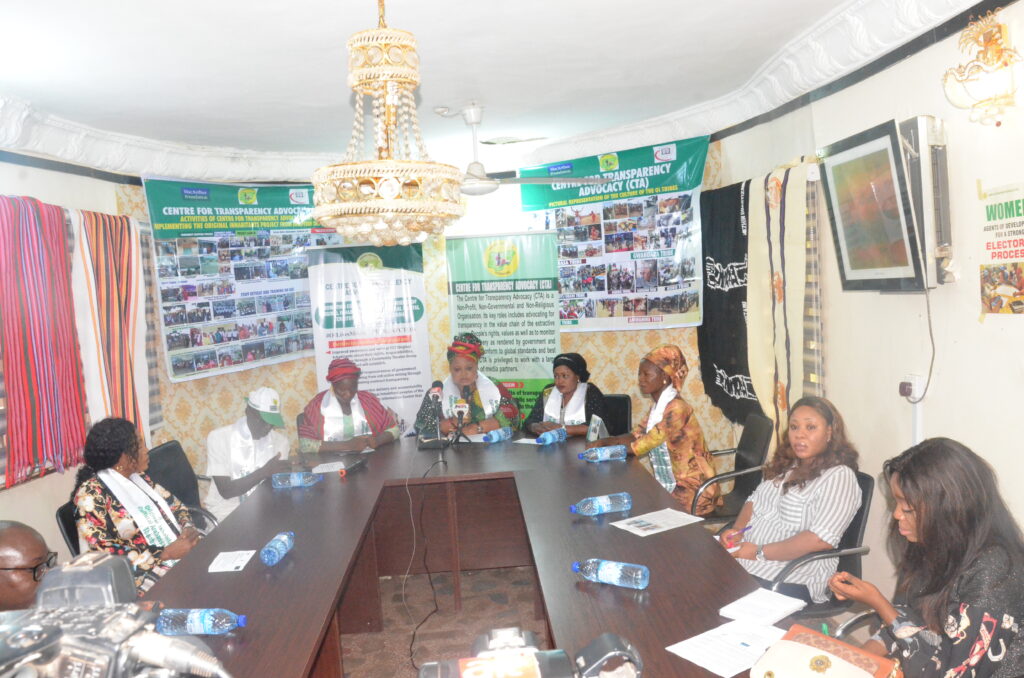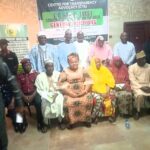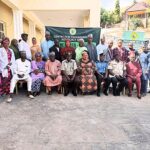Indigenous people are inheritors and practitioners of unique cultures and ways of relating to people and the environment. In order to raise awareness of their needs and struggle for social justice, every August commemorates the International Day of the World’s Indigenous People. The theme for 2022 focuses on ‘The Role of Indigenous Women in the Preservation and Transmission of Traditional Knowledge’. The Original Inhabitants of the FCT women in collaboration with Centre for Transparency Advocacy (CTA) find it of great essence to hold a press conference for indigenous women to speak about their issues and also communicate their role in the preservation of culture in general. |
Objective(s) of the activity: – To disseminate information and knowledge about the role of indigenous women in the preservation and transmission of traditional knowledge. – To communicate some of the challenges, marginalization and discrimination faced by indigenous women in FCT including women with disabilities. |
THE EXECUTIVE DIRECTORS SPEECH
Gentlemen of the Press.
We sincerely welcome you to this Press Conference by the Women members of the CTA OI Ambassadors in continuation of the celebration of the Indigenous People’s Day that took place on August 9, 2022.
Women took the centre stage in the 2022 celebration of the International Day of the World’s Indigenous Peoples with the theme, “The Role of Indigenous Women in the Preservation and Transmission of Traditional Knowledge”. The Centre for Transparency Advocacy participated actively in the weeklong celebration that included, National Dialogue, Cultural Rally and an African Regional Conference in collaboration with the other cohort’s members led by CHRICED with support from MacArthur Foundation.
The Cultural Ambassadors Group that was established by the CTA as agents of cultural rebirth are specially placed as community volunteers that are raising the consciousness of the Original Inhabitants to promote the socio-economic, political and cultural rights of the Original Inhabitants of the FCT in their various communities.
The women members of the Ambassador group and women across cultures are recognized importantly for the role they play in the preservation of the different aspects of the people’s culture yet are the most marginalized and discriminated against.
Indigenous People Day was first celebrated on August 9, 1982, as enlisted by the UN Working Group on Indigenous Populations. On this day, people from around the world were encouraged to spread the UN’s message on the protection and promotion of the rights of indigenous peoples. On 23 December 1994, the United Nations General Assembly decided, in its resolution 49/214, that the International Day of the World’s Indigenous People shall be observed on 9 August every year as stated earlier.
It is important to note that Indigenous Peoples are distinct social and cultural groups that share collective ancestral ties to the lands and natural resources where they live, occupy or from which they have been displaced. These are peoples with pre-existing sovereignty who were living together as a community prior to contact with settler populations.
CHALLENGES
“For decades, the OIs of the FCT have faced several forms of infringement of their fundamental rights and women face double these challenges. This has manifested in the form of institutionalized discrimination, disenfranchisement, and outright marginalization within the Nigerian polity.” These include eroding cultural values, environmental degradation through irresponsible mining activities and skewed contract negotiation and community development agreements by mining operators and construction entities within the FCT. The brunt of these rights infringements is born mostly by the women who are variously disadvantaged. Indigenous women are seen as the protectors and custodians of cultural values and as the guarantors of their peoples’ survival; violations of their cultural rights therefore tend to constitute spiritual violence against indigenous women, and the children yet unborn.
Indigenous women face significant challenges to the full enjoyment of their human rights as well as experience multiple forms of discrimination which includes lack access to education, health care and ancestral lands. They also face disproportionately high rates of poverty and are subjected to violence, such as domestic violence and sexual abuse, including in the contexts of trafficking and armed conflict.
As the United Nations Permanent Forum on Indigenous Issues (UNPFII) has stated, globalization presents additional challenges in many parts of the world. Indigenous women’s roles have eroded due to the compounding factors of loss of natural resources and depletion of the ecosystems, their transformation into cash economies, changes in local, social, and decision-making structures, and their lack of political status within States. This is manifest in the FCT
Need we state here clearly that “Indigenous Peoples especially the women carry a fragile but essential part of our common humanity. As individuals and societies, the women represent an irreplaceable diversity. Participation in development should not mean absorption into the mainstream – on the contrary, our task is to ensure that the human rights and human potential of Indigenous women receive the needed attention; that development policies recognize the unique contribution and capacity of Indigenous women; that policymakers understand the Millennium Development Goals and the concept of development in ways which support and engage with indigenous culture, and that women become partners in a common enterprise.”
It has become a daunting task in the FCT to repeal policies and practices that diminish opportunities for indigenous women and perpetuate their disempowerment. Demolishing structural barriers to eliminate complex oppressions experienced by indigenous women is the major challenge for indigenous peoples throughout the world without the exclusion of the FCT. The reluctance of the FCT and the federal government to implement international human rights conventions is a major hurdle in overcoming educational, health, vocational/economic, and political disadvantages for indigenous women in the FCT. Denial of indigenous peoples’ rights has disenfranchised women in the FCT severely.
It is important therefore, that structural imbalance that impedes the wellbeing of the Original Inhabitants women in the FCT be removed.
We therefore ask;
That the rights of women be recognized in the negotiations for community development agreements by including them as community negotiators.
That there should be provided basic amenities such as water, energy, basic health care or PHC in the IOs communities.
That they should be integrated into the development going on around them.
That they should be included in political activities across the different political platforms; we acknowledge the appointment of one of the women ambassadors as the media aide to the newly elected AMAC chairman and more of these recognitions.
That special attention and provisions be made for the women OIs in the FCT as the agitation for the protection of their rights should be propagated by everyone.
That the economic Rights, skills and livelihood of women be guaranteed and protected
CONCLUSION:
We acknowledge that it is not enough that women should be encouraged to go into skill acquisitions, but it is also more sustainable if they’re empowered to access some kick-up grants that would enable them to practicalize the skills acquired. Most women’s source of livelihood is firewood fetching & selling, hawking groundnuts, corn amongst others but we all know these aren’t sustainable businesses as OI women are regularly faced with harassment from the taskforce while in the cities, firewood hewing is also prohibited/discouraged.
The Center for Transparency Advocacy is implementing a two-year project: Promoting Cultural Values and Rights of Original Inhabitants (OIs) in Federal Capital Territory (FCT) through Drama and Art Forms. supported by the MacArthur Foundation Through the Resource Centre for Human Rights & Civic Education (CHRICED)
Thank you
Faith Nwadishi, Executive Director CTA
Chief Lazarus Nyaholo, Chairman CTA- OI Cultural Ambassadors
